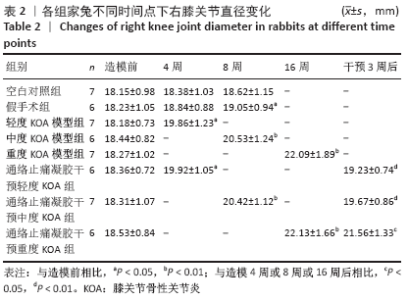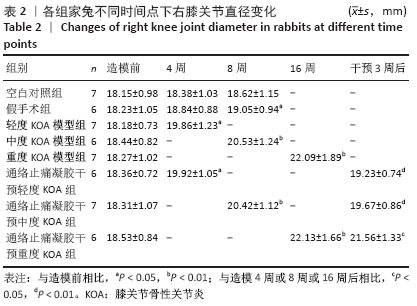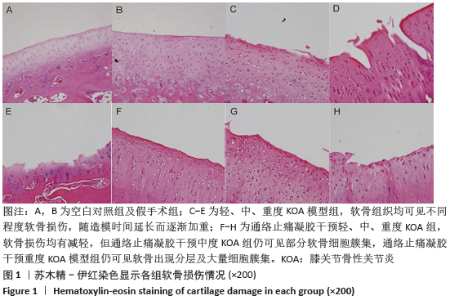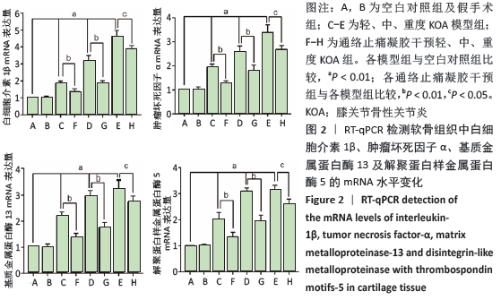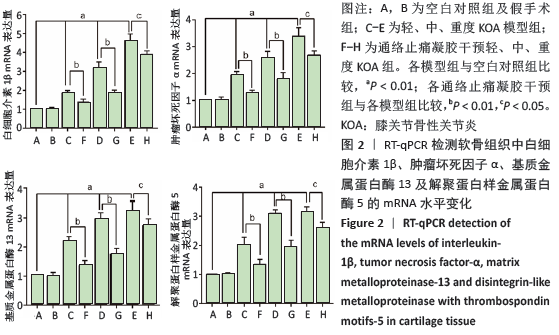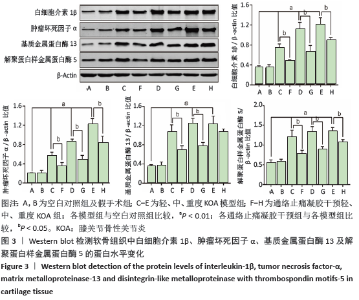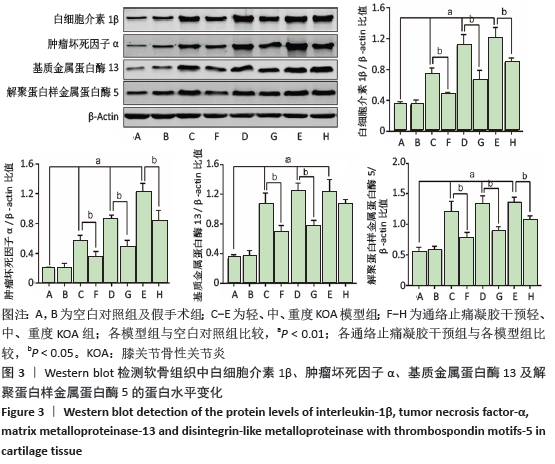[1] HUNTER DJ, BIERMA-ZEINSTRA S. Osteoarthritis. Lancet. 2019;393 (10182):1745-1759.
[2] SHERWOOD J. Osteoarthritis year in review 2018: biology. Osteoarthritis Cartilage. 2019;27(3):365-370.
[3] NEOGI T. The epidemiology and impact of pain in osteoarthritis. Osteoarthritis Cartilage. 2013;21(9):1145-1153.
[4] MALEMUD CJ. Biologic basis of osteoarthritis: state of the evidence. Curr Opin Rheumatol. 2015;27(3):289-294.
[5] GOLDRING MB, OTERO M. Inflammation in osteoarthritis. Curr Opin Rheumatol. 2011;23(5):471-478.
[6] KAPOOR M, MARTEL-PELLETIER J, LAJEUNESSE D, et al. Role of proinflammatory cytokines in the pathophysiology of osteoarthritis. Nat Rev Rheumatol. 2011;7(1):33-42.
[7] KONTTINEN YT, SILLAT T, BARRETO G, et al. Osteoarthritis as an autoinflammatory disease caused by chondrocyte-mediated inflammatory responses. Arthritis Rheum. 2012;64(3):613-616.
[8] 王庆甫,祁印泽,陈兆军,等.超声电导透射通络止痛中药外治膝骨性关节炎的临床观察[J].北京中医药大学学报,2010,33(4): 283-285.
[9] 王欢,王庆甫,史榕荇,等.桂皮醛及白芍总苷对骨关节炎滑膜炎性反应的影响[J].中华中医药杂志,2018,33(8):3356-3360.
[10] 杨黎黎,王庆甫,王欢,等.通络止痛方对人膝骨关节炎滑膜炎性细胞TLR4、IL-1β及NO的影响[J].中华中医药杂志,2017,32(9): 4124-4126.
[11] ROGART JN, BARRACH HJ, CHICHESTER CO. Articular collagen degradation in the Hulth-Telhag model of osteoarthritis. Osteoarthritis Cartilage. 1999;7(6):539-547.
[12] 姜铃霞,姚伟武,赵海南,等.实验性软骨损伤的生物学表达与病理分期对照研究[J].诊断学理论与实践,2013,12(1):80-85.
[13] CHEN P, HUANG L, MA Y, et al. Intra-articular platelet-rich plasma injection for knee osteoarthritis: a summary of meta-analyses. J Orthop Surg Res. 2019;14(1):385.
[14] JEVSEVAR DS, BROWN GA, JONES DL, et al. The American Academy of Orthopaedic Surgeons evidence-based guideline on: treatment of osteoarthritis of the knee, 2nd edition. J Bone Joint Surg Am. 2013; 95(20):1885-1886.
[15] AGARWAL S, NEOGI DS, MORGAN-JONES R. Metaphyseal sleeves in revision total knee arthroplasty: Minimum seven-year follow-up study. Knee. 2018;25(6):1299-1307.
[16] HOSSAIN F, PATEL S, HADDAD FS. Midterm assessment of causes and results of revision total knee arthroplasty. Clin Orthop Relat Res. 2010;468(5):1221-1228.
[17] SANTANGELO KS, NUOVO GJ, BERTONE AL. In vivo reduction or blockade of interleukin-1β in primary osteoarthritis influences expression of mediators implicated in pathogenesis. Osteoarthritis Cartilage. 2012;20(12):1610-1618.
[18] LIU-BRYAN R. Synovium and the innate inflammatory network in osteoarthritis progression. Curr Rheumatol Rep. 2013;15(5):323.
[19] SUANTAWEE T, TANTAVISUT S, ADISAKWATTANA S, et al. Upregulation of inducible nitric oxide synthase and nitrotyrosine expression in primary knee osteoarthritis. J Med Assoc Thai. 2015;98 Suppl 1:S91-97.
[20] CHISARI E, YAGHMOUR KM, KHAN WS. The effects of TNF-alpha inhibition on cartilage: a systematic review of preclinical studies. Osteoarthritis Cartilage. 2020;28(5):708-718.
[21] KLEIN T, BISCHOFF R. Physiology and pathophysiology of matrix metalloproteases. Amino Acids. 2011;41(2):271-290.
[22] ZHENG W, FENG Z, YOU S, et al. Fisetin inhibits IL-1β-induced inflammatory response in human osteoarthritis chondrocytes through activating SIRT1 and attenuates the progression of osteoarthritis in mice. Int Immunopharmacol. 2017;45:135-147.
[23] YANG CY, CHANALARIS A, TROEBERG L. ADAMTS and ADAM metalloproteinases in osteoarthritis - looking beyond the ‘usual suspects’. Osteoarthritis Cartilage. 2017;25(7):1000-1009.
[24] VERMA P, DALAL K. ADAMTS-4 and ADAMTS-5: key enzymes in osteoarthritis. J Cell Biochem. 2011;112(12):3507-3514.
[25] 戚晴雪,马玉峰,吴忌,等.低频超声促透通络止痛中药对不同程度膝骨关节炎大鼠模型CTX-Ⅱ、COMP及MMP-3的影响[J].世界中医药, 2015,10(4): 564-569.
[26] 戚晴雪,马玉峰,吴忌,等.低频超声促透通络止痛方对大鼠不同程度膝骨关节炎的影响[J].南京中医药大学学报,2014,30(3): 244-248.
[27] 王欢,王庆甫,杨黎黎,等.桂皮醛对滑膜成纤维细胞增殖、凋亡及周期影响的实验研究[J].天津中医药,2017,34(1):54-58.
[28] 王欢,王庆甫,杨黎黎,等.《伤寒论》中不同比例的桂芍配伍对骨关节炎滑膜炎性反应的作用研究[J].中华中医药杂志,2017,32(5): 2202-2205.
[29] 王欢,王庆甫,唐学章,等.白芍总苷对滑膜成纤维细胞增殖、凋亡及周期影响的实验研究[J].天津中医药,2017,34(12): 841-844.
[30] 祁印泽.新型通络止痛方凝胶制剂研究及其治疗膝骨关节病的临床观察[D].北京:北京中医药大学,2018.
[31] 张晓哲,张栋,马玉峰,等.通络止痛凝胶制剂对膝骨关节炎大鼠的影响[J].中华中医药杂志,2019,34(5):2184-2188.
|
